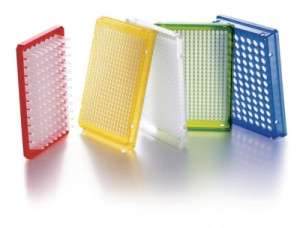Eppendorf® twin.tec™ PCR Plates
By Eppendorf
Eppendorf® twin.tec™ PCR plates are manufactured with "twin-shot technology," an injection mold process that combines two materials: virgin polypropylene for the wells and polycarbonate, an especially rigid material, for the plate deck and skirt.
Polypropylene provides an inert, nonwetting surface that prevents DNA, RNA, and enzymes from binding, and it improves recovery from wells even when working with minute volumes. Polycarbonate provides mechanical stability, and it facilitates handling of the plates. The enhanced stiffness offers improved plane parallelism in the plate deck before, during, and after a PCR, and it ensures a more secure seal. Bending or curving of the skirt is virtually eliminated, making twin.tec PCR plates ideal for use with automation or robotics.
Eppendorf® twin.tec™ PCR plates also offer a 20% reduction in wall thickness compared to standard thin-walled tubes. This provides a snug fit for the well against thermal blocks, and it ensures virtually undisturbed heat transfer from the block to the sample. Raised well rims optimize sealing effectiveness and reduce the risk of cross-contamination. All commonly used sealing methods—cap strips, adhesive films, and foils—can be applied to Eppendorf® twin.tec™ PCR plates for heat sealing and ultimate protection against evaporation.
Features:
- One-piece design: polycarbonate and polypropylene for optimum performance
- Improved plane parallelism
- Manufactured for rigidity
- Improved well-to-well tolerance
- Extremely thin-walled for optimum heat transfer into the sample
- Fits most thermal cyclers
- Cut-away corner and alphanumeric grid referencing
- Raised well rims for effective sealing and reduced risk of cross-contamination
- Autoclavable
